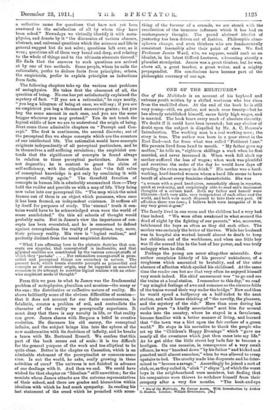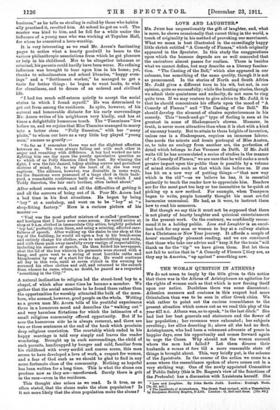ONE OF THE MULTITUDE.* One of the Multitude is an
account of his boyhood and extreme youth written by a skilled workman who has risen from the unskilled class. At the end of the book he is still very young—still, we gather, not much over twenty—but he has already established himself, earns fairly high wages, and is married. The book bears every mark of absolute sincerity.
We doubt if it could have been invented; but any shadow of doubt upon the subject is dispelled by Mr. A. C. Benson's Introduction. The working man is a real working man ; the story is true. The author was born in a poor street in the East End—not far from what was called " Petticoat Lane." His parents lived from hand to mouth. " My father gave my mother," he tells us, "eighteen shillings a week when he first married, and never increased it. When work fell slack my mother suffered the loss of wages ; when work was plentiful and overtime the order of the day be would have days off spending the extra money in drink." His mother was a. hard- working, hard-hearted woman whom a, hard life seems to have bereft of almost every feminine characteristic. She was
"a woman with a good head-piece, remarkably sharp in repartee, quick at reckoning, and surprisingly able to read one's innermost thoughts of a certain kind.. Both my father and herself were illiterate—both very able, very independent of each other and the world, and both very much disposed to take their own part. Of affection there was none ; I believe both were incapable of it in any very great degree."
The family lived in one room and the children had a very bad time indeed. " We were often awakened in what seemed the dead of night by the fighting of our parents," who, moreover, belaboured the boys as often as they did each other. The mother was certainly the better of the two. While her husband was in hospital she worked herself almost to death to keep her children out of the workhouse, and when one little boy was ill she nursed him to the best of her power, and was truly unhappy when he died.
Perhaps the young are never altogether miserable. Our author complains bitterly of his parents' unkindness, of a roughness which amounted to brutality, and of the utter absence of affection which spoiled his childhood. At the same time the reader can but see that very often he enjoyed himself very much indeed. His chief amusement was "to go and see the trains at a local station. I remember to this day," we read " my mingled feelings of awe and romance as the sinuous folds of the trains wound their way under the bridge." Now and then he would spend a halfpenny on a half-ticket to the next
station, and walk home thinking of " the novelty, the pleasure, and the mystery of the ride." More than once during his earliest years " a kindly association" sent him for several
weeks into the country, where he stayed in a farmhouse, became familiar with a better manner of living, and learned
that " the town was a blot upon the fair surface of a green world." He stops in his narrative to thank the people who
set up the " Children's Happy Evenings" which " gave me nearly all the sweetness which just then came into my life." As he got older the little street boy bade fair to become a hooligan. On one occasion, in consequence of a very small offence, he was " knocked down " by his father "and kicked and punched until almost senseless," when ho was allowed to creep upstairs to bed. The cruelty made him desperate and be deter.. mined to " become a savage." Accordingly he joined a sort of club, or, as they called it, " click " (" clique "), of which the worst boys in the neighbourhood were members, but finding that his companions were thieves he withdrew himself from their company after a very few months. " The hook-and-eye • One of the Multitude. By George Acorn, With Introduction by lath= C. Boom. London: WM= Heinemann. [Be.]
business," as he tells us stealing is called by those who babitu ally practised it, revolted him. At school he got on well The master was kind to him, and he fell for a while under the influence of a young man who was working at Toynbee Hall, for whom he conceived a hero-worship.
It is very interesting as we read Mr. Acorn's fascinating pages to notice what a hearty goodwill he bears to the various philanthropic associations from which he got pleasure or help in his childhood. Not to be altogether inhuman or criminal, his parents could hardly have been worse. No refining influence was brought to bear upon him in his home; yet, thanks to schoolmasters and school libraries, "happy even- ings " and a " Settlement worker," he managed to get a taste for better things : he began to want books, to wish for cleanliness, and to dream of an ordered and civilized life.
"I had too much self-esteem quietly to accept the social status in which I found myself." He was determined to get out from among the residuum. In spite, however, of his natural and honourable distaste for his early surroundings Mr. Acorn writes of his neighbours very kindly, and has at times a delightfully humorous touch. The " Timminses " live before us, and we rejoice that Miss Timmins managed to marry into a better class. "Polly Smeeton," with her "many plaits," to whom our hero as a very little boy played "young man," amuses us greatly :—
" So far as I remember there was not the slightest affection between us. We were always falling out with each other in anger and reuniting with diffidence. A boy had worked me into fighting him one day upon the purely speculative question as to which of us Polly Smeeton liked the best. By winning the fight, I won the fair damsel, tol my abiding sorrow and periodical distress of mind ; for, to say the least of it, she was very captious. The alliance, however, was desirable in some ways, for the Smeetons were possessed of a large shed in their back- yard, a remarkable contrivance built of wood, in which I and Teddy Smeeton, the fair one's brother, often larked about."
After school comes work, and all the difficulties of getting it
and all the sorrows of being out of it. Poor Mr. Acorn had a bad time in his first situations. He began by being
" boy " at a cookshop, and went on to be " boy" at " a shop-fitting factory." Here is a curious picture of his master :-
" Veal was the most perfect mixture of so-called 'gentleman' and hooligan that I have ever come across. He would arrive at shop at 9 a.m. clothed in immaculate City attire, brightly polished top hat,' perfectly clean linen, and using a mincing, affected care- fulness of speech. After walking up the stairs to our shop at tho top of the building, he would sit upon a box in his bench-room and entirely change his clothes, even to underclothing and socks, and with them pack away carefully every vestige of respectability, including his manner of speech. He then folded his newspaper, shut the lid of the box wherein his garments were stowed with a bang, and gave vent to a string of most horrible oaths and blasphemies by way of a start for the day. He would continue all day in this vein, until at seven o'clock in the evening he resumed his other clothes and self, and returned to the suburb from whence he came, where, no doubt, he passed as a respected something in the City.'"
A natural inclination to religion led the street-bred boy to a chapel, of which after some time he became a member. We gather that the social amenities to be found there rather than the opportunities for worship attracted the bulk of the mem- bers, who seemed, however, good people on the whole. Writing as a grown man Mr. Acorn tells of his youthful experiences there in a humorous mood and describes the " walking out " and very harmless flirtations for which the intimacies of a small religions community offered opportunity. But if he sees the humorous side he is always reverent, and there are two or three sentences at the end of the book which proclaim deep religious conviction. The courtship which ended in his happy marriage is told very simply and leaves the reader wondering. Brought up in such surroundings, the child of such parents, handicapped by hunger and cold, familiar from his childhood with every sordid and coarse scene, this man seems to have developed a love of work, a respect for women, and a fear of God such as we should be glad to find in any more fortunate class of the community. Nothing so hopeful
has been written for a long time. This is what the slums can produce now as they are—unreformed. Surely there is grit
in the race—even in the residuum.
This thought also arises as we read. Is it true, as so
often stated, that the slums make the slum population P Is it not more likely that the slum population make the slums P



































 Previous page
Previous page